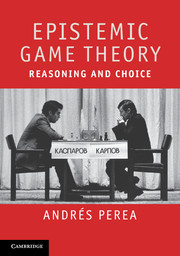Epistemic Game Theory: Reasoning and Choice

Contents
hapter 1: Introduction
Part I : Standard Beliefs in Static Games
Chapter 2: Belief in the Opponent’s Rationality
2.1. Beliefs about the opponent’s choice 2.2. Utility functions 2.3. More than two players 2.4. Choosing rationally 2.5. Strictly dominated choices
2.6. Belief in the opponents’ rationality 2.7. Graphical method 2.8. Algorithm 2.9. Proofs
Practical problems
Theoretical problems
Literature
Chapter 3: Common Belief in Rationality
3.1. Beliefs about the opponent’s beliefs 3.2. Belief hierarchies 3.3. Epistemic model 3.4. Common belief in rationality 3.5. Graphical method
3.6. Existence 3.7. Algorithm 3.8. Order independence 3.9. Proofs
Practical problems
Theoretical problems
Literature
Chapter 4: Simple Belief Hierarchies
4.1. Simple belief hierarchies 4.2. Nash equilibrium 4.3. Computational method 4.4. Belief that opponents hold correct beliefs 4.5. Proofs
Practical problems
Theoretical problems
Literature
Part II : Lexicographic Beliefs in Static Games
Chapter 5: Primary Belief in the Opponent’s Rationality
5.1. Cautious reasoning about the opponent 5.2. Lexicographic beliefs 5.3. Belief hierarchies and types 5.4. Cautious types 5.5. Primary belief in the opponent’s rationality 5.6. Common full belief in “primary belief in rationality” 5.7 Existence 5.8. Weakly dominated choices 5.9. Algorithm
5.10. Proofs
Practical problems
Theoretical problems
Literature
Chapter 6: Respecting the Opponent’s Preferences
6.1. Respecting the opponent’s preferences 6.2. Common full belief in “respect of preferences” 6.3. Existence 6.4. Why elimination of choices does not work 6.5. Preference restrictions and likelihood orderings 6.6. Algorithm 6.7. Order independence 6.8. Proofs
Practical problems
Theoretical problems
Literature
Chapter 7: Assuming the Opponent’s Rationality
7.1. Assuming the opponent’s rationality 7.2. Common assumption of rationality 7.3. Algorithm 7.4. Order dependence 7.5. Proofs
Practical problems
Theoretical problems
Literature
Part III : Conditional Beliefs in Dynamic Games
Chapter 8: Belief in the Opponents’ Future Rationality
8.1. Belief revision 8.2. Dynamic games 8.3. Conditional beliefs 8.4. Epistemic model 8.5. Belief in the opponents’ future rationality 8.6. Common belief in future rationality 8.7. Existence 8.8. Algorithm 8.9. Order independence 8.10. Backwards order of elimination 8.11. Backward induction
8.12. Games with unobserved past choices 8.13. Bayesian updating 8.14. Proofs
Practical problems
Theoretical problems
Literature
Chapter 9: Strong Belief in the Opponents’ Rationality
9.1. Strong belief in the opponents’ rationality 9.2. Common strong belief in rationality 9.3. Algorithm 9.4. Comparison with backward dominance procedure 9.5. Order dependence 9.6. Rationality orderings 9.7. Bayesian updating 9.8. Proofs
Practical problems
Theoretical problems
Literature
Bibliography
Index
